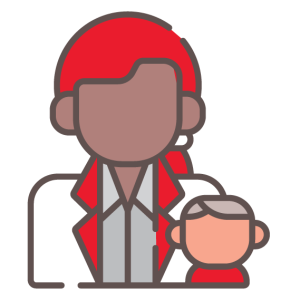Early Childhood Mental Health
Early childhood mental health resources for children ages birth to five.

Screening and Assessment Tools
Birth to 5: Watch Me Thrive! A Primary Care Provider’s Guide for Developmental and Behavioral Screening: This guide, specifically designed for primary care providers, offers information on how you can best support the young children and families served in your practice.
Birth to 5: Watch Me Thrive! A Compendium of Screening Measures For Young Children: The purpose of this compendium is to identify a set of first-line screening tools that meet certain quality parameters set by the aforementioned federal partners. Building on a broader technical review of screening tools by Child Trends, Early childhood developmental screening: A compendium of measures for children ages birth to five, the federal partners identified 11 screening tools that met the following quality criteria: (a) tool accuracy (sensitivity and specificity of 0.7 and above), (b) inclusion of family input, and (c) inclusion of the social and emotional domain of development.
Ages and Stages Questionnaires: Social-Emotional (ASQ:SE-2): The ASQ:SE-2, a caregiver-completed screening tool, assesses self-regulation, compliance, communication, adaptive behaviors, autonomy, affect, interaction with people, and parent concerns. Materials can be freely reproduced after a startup kit is purchased.
Early Childhood Screening Assessment (ECSA): The ECSA is a primary care screening measure developed to identify very young children who need further emotional or behavioral assessment. Questionnaires and scoring guidelines are freely available from the website.
Survey of Wellbeing of Young Children (SWYC): The SWYC is a free comprehensive screening tool for children under the age of 5 ½ that assesses developmental milestones, emotional/behavioral growth, and family risk factors. It can be downloaded for free.
Learn the Signs. Act Early.: Developmental milestone tracking materials, resources, and app from the CDC
Therapy Tools and Patient Handouts
Early Relational Health: Resources from the AAP about early relational health.
Tucker Turtle Takes Time to Tuck and Think: Free child-facing video and storybook on the Tucker Turtle emotional regulation technique.
Children’s National Early Childhood Behavioral Health Program Caregiver Webinars: The Division of Psychology and Behavioral Health is collaborating with the Center for Autism Spectrum Disorders to present an interactive webinar series for caregivers featuring experts from Children’s National Hospital.
Managing Difficult Behavior: Handouts that can be used with families on managing difficult behavior, housed on the Tulane Early Childhood Collaborative website
Treatment and Pharmacology Guide
Infant and Early Childhood Mental Health in Pediatric Care: Information from the National Center for Children in Poverty at the Bank Street Graduate School of Education
Head Start Early Childhood Learning and Knowledge Center: Resources from the US Department of Health and Human Services Administration for Children and Families.
Center of Excellence for Infant and Early Childhood Mental Health Consultation: Gathers in one place a wide range of materials that address the needs of Head Start staff and families for practical guidance on effective ways to promote young children’s social and emotional development, and reduce challenging behaviors.
Maryland Families Engage, Division of Early Childhood: Maryland’s Infant and Early Childhood Mental Health Consultation Project services are being provided! Contact your local program today to learn more about support services for childcare providers.
Zero to Three Think Babies™ Infant and Early Childhood Mental Health Resource List: This annotated resource list includes a range of materials, such as policy briefs, fact sheets, websites and tools, to help stakeholders learn about the issue.
Center on the Developing Child, Harvard University, Early Childhood Mental Health: Resources from the Center on the Developing Child at Harvard University related to early childhood mental health.
Billing and Coding
DC:0-5 Billing Crosswalk: The DC:0-5 Billing Crosswalk is a way for providers who are trained using the DC:0-5 to link specific diagnostic codes with corresponding codes from the DSM-V or ICD-10 to obtain reimbursement.
Webinars for Providers
AAP: Social and Emotional Problems in Children Birth to 5: This video focuses on using motivational interviewing techniques to identify and address social-emotional problems in children birth to 5.
AAP: Disruptive Behavior and Aggression: This video focuses on using motivational interviewing techniques to identify and address disruptive behavior and aggression.
Webinars: Head Start Early Childhood Learning and Knowledge Center: Resources from the US Department of Health and Human Services Administration for Children and Families.
Head Start Early Childhood Learning and Knowledge Center: Head Start and Early Head Start programs support the mental health of children, families, and staff every day. Early childhood mental health is the same as social and emotional well-being. It is a child’s developing capacity to express and regulate emotions, form trusting relationships, explore, and learn—all in the cultural context of family and community. The mental health of children and the adults that care for them is essential for school readiness.


